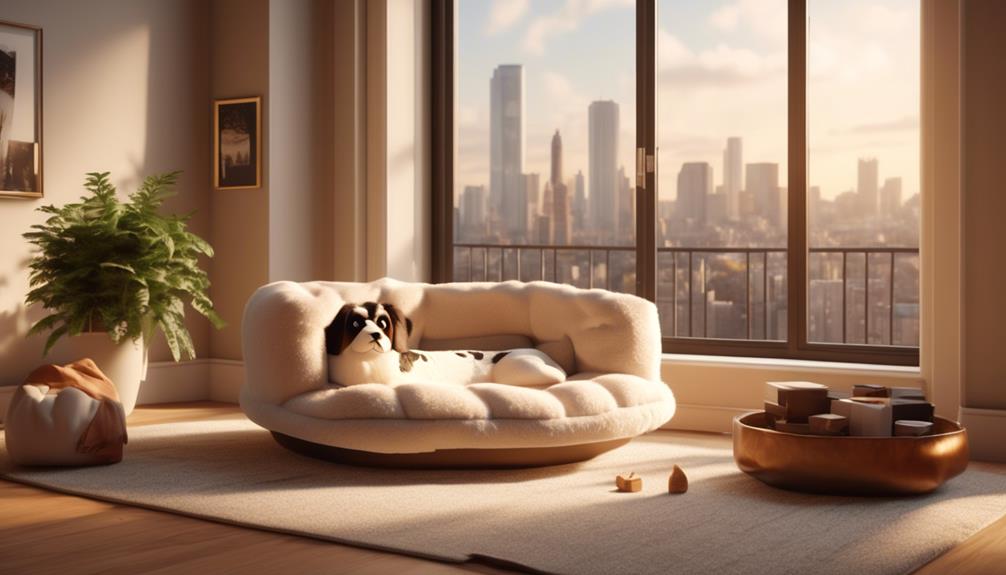
Are you aware that 67% of dog owners in urban areas live in apartments? It's a common misconception that apartment living is not suitable for dog ownership. However, with careful consideration and planning, you can find the perfect dog that will thrive in your apartment.
In this discussion, we will explore the various factors you need to take into account when choosing a dog for apartment living. From qualities like being quiet and low-energy to managing your neighbors' comfort, we will cover all the essential aspects that will help you make an informed decision.
So, if you're curious about how to find the perfect dog for your apartment lifestyle, keep reading to discover some valuable insights.
Key Takeaways
- Size alone should not be the sole determinant for apartment suitability; prioritize qualities such as being quiet, low-energy, calm indoors, and having good manners when selecting a dog.
- Certain small dog breeds with higher energy levels can still thrive in apartments.
- Dogs who are highly sensitive, independent thinking, or assertive may be harder for first-time dog parents to manage in an apartment setting.
- Consider the impact of a dog's barking on neighbors and household members; choose a quieter dog breed if noise restrictions or close neighbors are a concern.
Adapting to Apartment Living
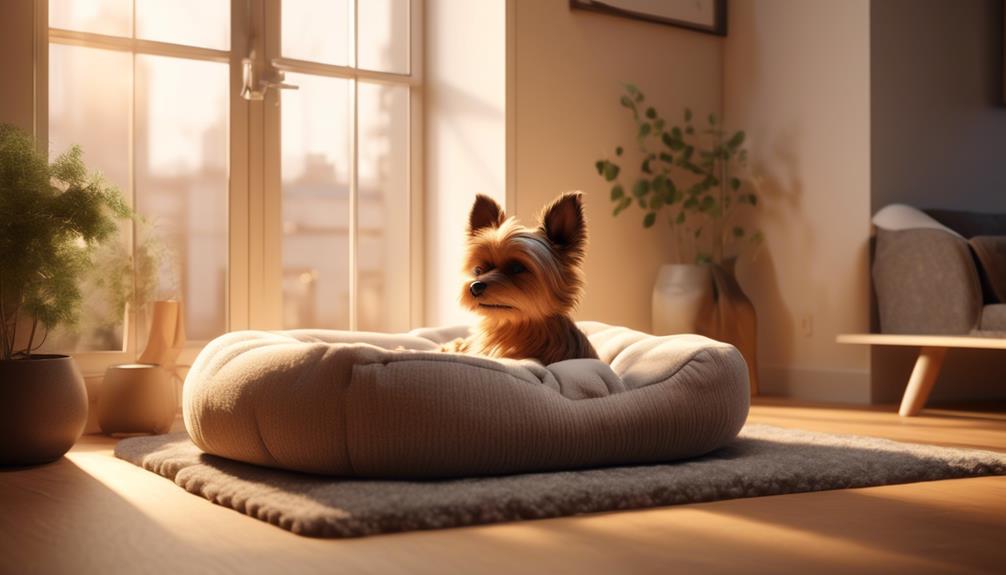
Adapting to apartment living can be a smooth transition for dogs that possess the right qualities and characteristics. Size alone shouldn't be the sole determinant for apartment suitability. Desirable qualities in an apartment dog include being quiet, low-energy, and polite.
Certain small dog breeds with higher energy levels can still thrive in apartments. When selecting a dog, prioritize qualities such as being quiet, low-energy, calm indoors, and good manners to ensure the comfort of your neighbors.
Some larger breeds can adapt well to apartment living with lower energy levels. However, dogs who are highly sensitive, independent thinking, or assertive may be harder for first-time dog parents to manage. It's also important to consider the breed's tolerance for noise and chaotic environments.
Desirable Apartment Dog Qualities
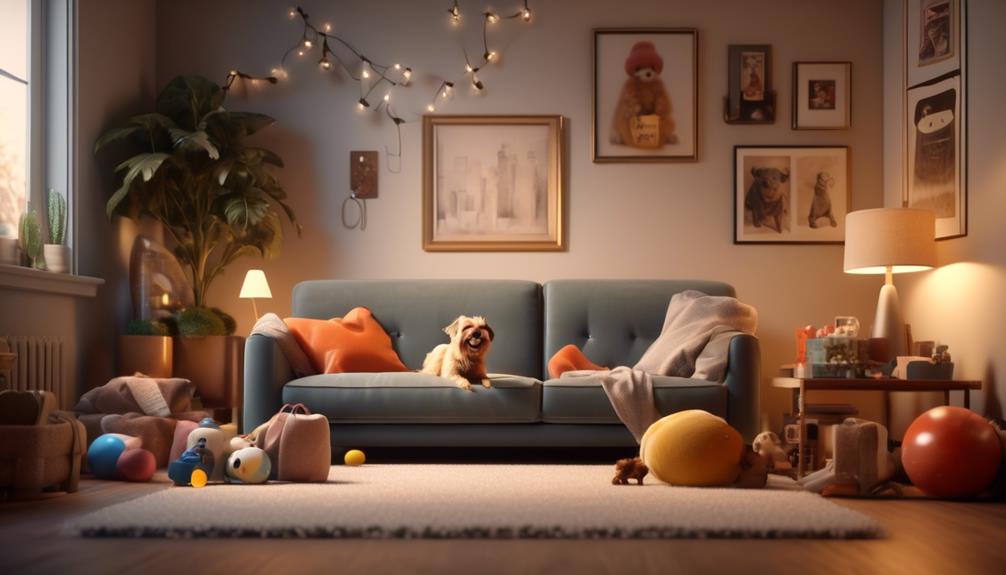
When choosing a dog for apartment living, it is important to prioritize certain qualities that will make them well-suited to this type of environment. Desirable apartment dog qualities include being quiet, low-energy, and polite. Consider the impact of their behavior on your neighbors and select a breed that will not disturb the peace. Additionally, dogs who are calm indoors and have good manners will be easier to manage in a smaller space. To help you visualize the qualities you should look for in an apartment dog, here is a table that highlights these desirable qualities:
| Desirable Qualities | Description | Emotional Response |
|---|---|---|
| Quiet | Does not bark excessively | Peaceful |
| Low-energy | Relaxed and not hyperactive | Calm |
| Polite | Well-mannered and obedient | Respectful |
Finding a dog with these qualities will ensure a harmonious living environment in your apartment.
Suitability Beyond Size
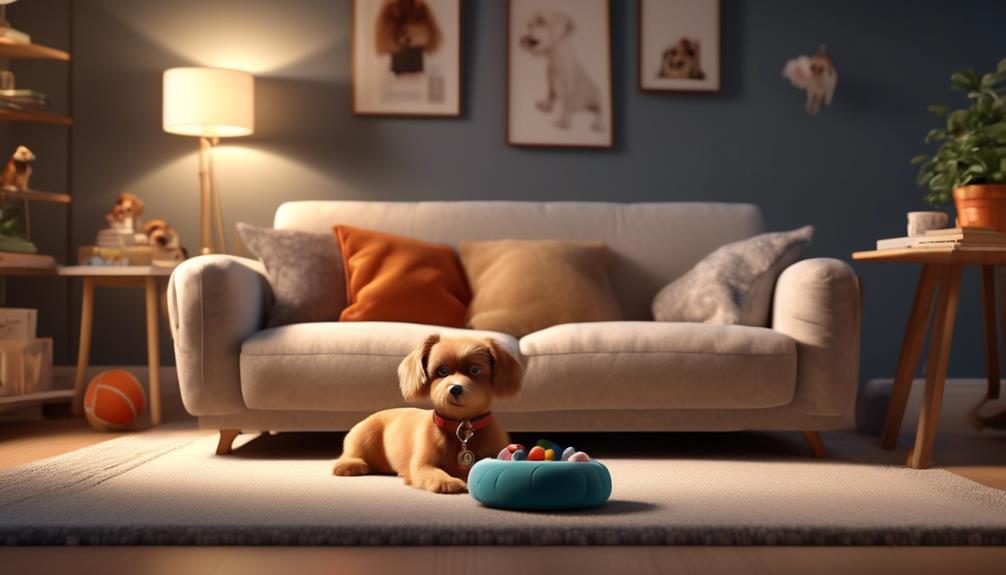
Are there other factors to consider beyond just the size of a dog when determining their suitability for apartment living? Absolutely!
While size is important, it isn't the only factor to consider. You also need to think about the dog's energy level, temperament, and behavior.
Some small dog breeds may have high energy levels and require a lot of exercise, which mightn't be ideal for apartment living. On the other hand, there are larger breeds that have lower energy levels and adapt well to apartment living.
It's also important to consider how the dog will interact with your neighbors. Dogs that are quiet, low-energy, and well-mannered are typically more suitable for apartment living.
Managing Neighbors' Comfort

Consider your neighbors' comfort when selecting a dog for apartment living, ensuring a harmonious environment for all. Living in close proximity to others means that noise can easily travel between units, and a barking or howling dog can quickly become a source of frustration for your neighbors.
To manage your neighbors' comfort, choose a dog breed that's known for being quiet and less prone to excessive vocalization. Additionally, it's important to train your dog to be well-behaved and polite, both indoors and outdoors. Teaching your dog basic commands and manners will help prevent any disturbances to your neighbors, creating a peaceful living environment for everyone in the apartment complex.
Considerations for Larger Breeds
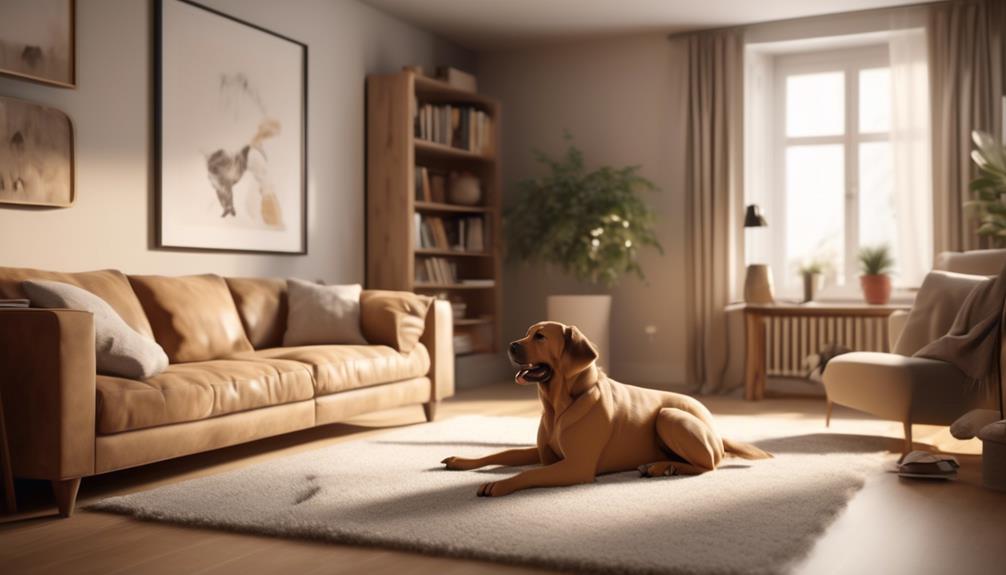
Larger breeds can thrive in apartment living if they have lower energy levels. While size alone should not be the sole determinant for apartment suitability, certain larger breeds can adapt well to apartment living as long as their energy levels are manageable. Consider prioritizing qualities such as being quiet, low-energy, calm indoors, and well-mannered. Take into account the comfort of your neighbors when selecting a dog. Here is a table showcasing some larger breeds that can be suitable for apartment living:
| Breed | Energy Level | Size |
|---|---|---|
| Cavalier King Charles Spaniel | Low to moderate | Small to medium |
| Basset Hound | Low to moderate | Medium to large |
| Bulldog | Low to moderate | Medium to large |
These breeds have lower energy levels and tend to be more laid-back, making them more compatible with apartment living. Remember to consider the specific needs and temperament of each breed before making a decision.
Challenges for First-Time Dog Parents

If you're a first-time dog parent, navigating the challenges of apartment living with a furry companion can be a learning experience. One challenge you may face is finding a dog that's well-suited for apartment living. It's important to consider factors such as size, energy level, and behavior when choosing a dog for your apartment.
Some small dog breeds with higher energy levels can still thrive in apartments, but it's important to prioritize qualities such as being quiet, low-energy, calm indoors, and having good manners. Additionally, you should consider your neighbors' comfort when selecting a dog.
Another challenge for first-time dog parents is managing a dog's aggression and fear. Aggression in dogs is often born out of fear and anxiety, and it's important to address these issues with proper training and socialization.
Lastly, the tendency for dogs to wander and bark or howl can also pose challenges in apartment living. Dogs with predatory instincts may have a tendency to wander, which can lead to dangerous situations. Some dog breeds are also more prone to barking or howling, which may not be suitable for noise-restricted areas.
Being aware of these challenges and taking the necessary steps to address them can help you navigate apartment living as a first-time dog parent.
Handling Noise and Chaos
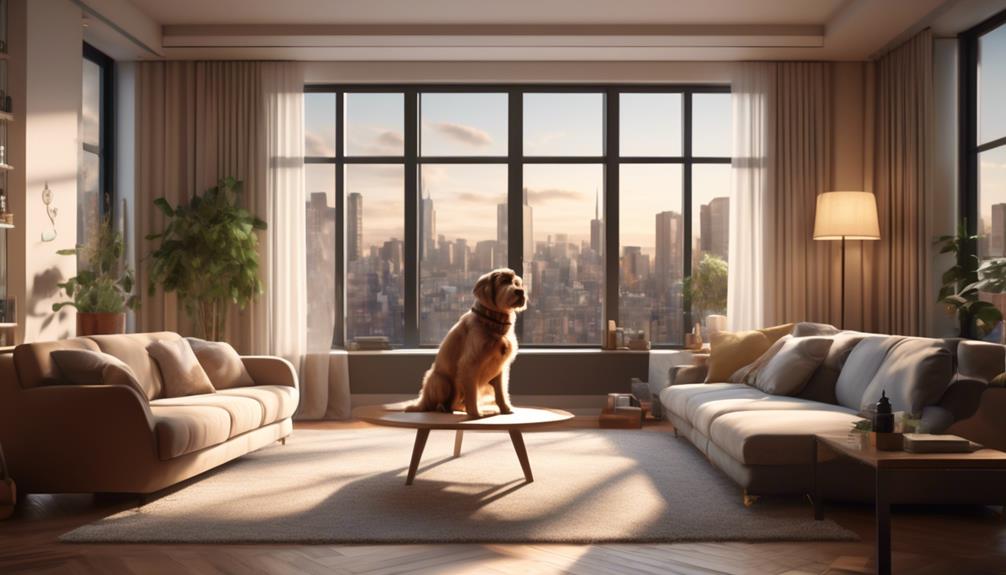
Dealing with the noise and chaos in an apartment can be challenging for both you and your dog. Living in close proximity to neighbors means that there may be constant background noise, such as loud music or the sound of people talking. This can be overwhelming for some dogs, especially those who are sensitive to loud sounds.
Additionally, the small space of an apartment can contribute to a feeling of chaos, with limited room for your dog to move around and explore. It's important to provide your dog with a calm and peaceful environment, even in a noisy and chaotic apartment.
This can be achieved by creating designated quiet spaces where your dog can retreat to when they need a break from the noise and chaos. Regular exercise and mental stimulation can also help to keep your dog calm and focused, even in a bustling apartment setting.
Vulnerability to Cold Weather

Living in an apartment can present unique challenges for dog owners, and one important consideration is the vulnerability of certain breeds to cold weather. Some breeds with very short coats and little body fat are more susceptible to the cold. To help you choose a dog that can handle colder temperatures, here is a table showcasing some vulnerable and cold-resistant breeds:
| Vulnerable Breeds | Cold-Resistant Breeds |
|---|---|
| Chihuahua | Siberian Husky |
| Greyhound | Bernese Mountain Dog |
| Whippet | Alaskan Malamute |
| Italian Greyhound | Newfoundland |
Keep in mind that even cold-resistant breeds may need additional protection in extreme weather conditions. Consider providing them with appropriate clothing, like dog jackets or sweaters, to keep them warm during walks or outdoor activities. Always prioritize your dog's comfort and well-being, especially when it comes to cold weather.
Aggression and Fear in Dogs
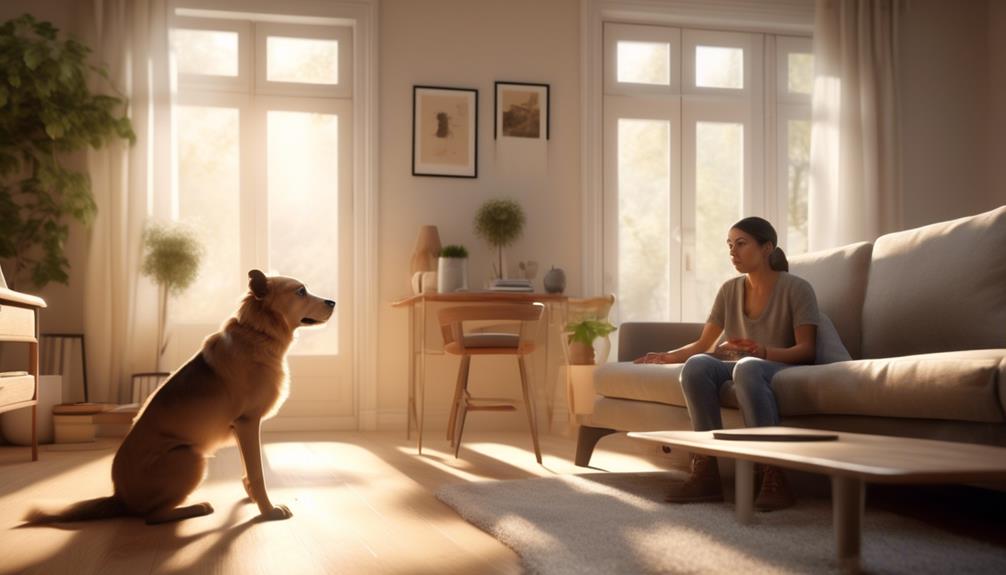
Aggression and fear can have a significant impact on a dog's behavior and interactions with humans and other animals. Aggression in dogs is often born out of fear and anxiety, and it can be a response to perceived threats. It's important to understand that observing aggression in dogs is different from their prey drive.
Fear and anxiety can lead to aggressive behaviors in dogs, especially towards humans. If you're considering getting a dog for apartment living, it's vital to choose a breed that's known for being calm and low-energy. Avoid breeds that are highly sensitive or independent thinking, as they may be harder to manage, especially for first-time dog parents.
It's crucial to prioritize the safety and comfort of both your dog and your neighbors.
Tendency to Wander and Bark
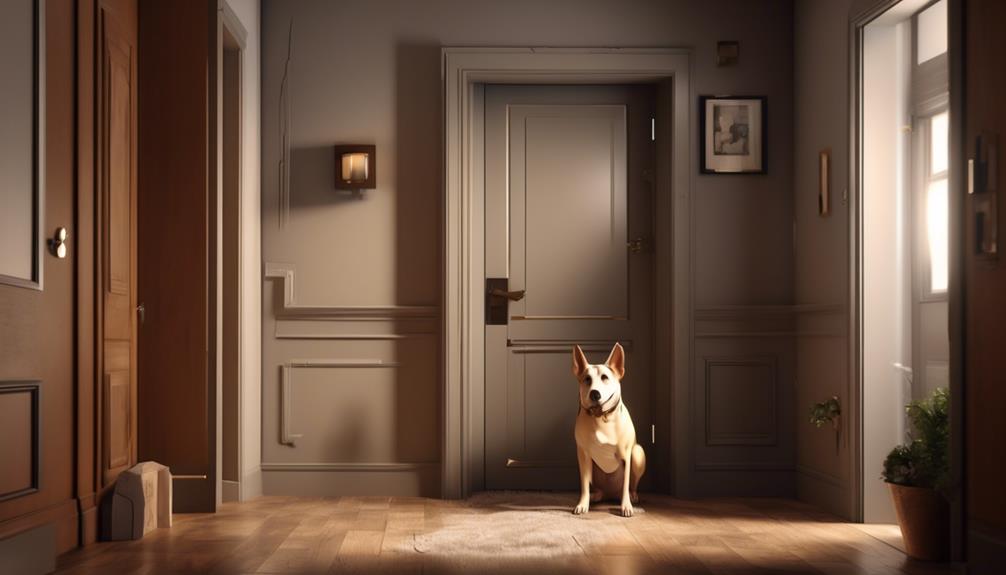
When considering a dog for apartment living, it's important to also take into account their tendency to wander and bark. Some dog breeds have a natural instinct to roam and explore, which can be a problem in a confined space like an apartment. Dogs that wander may put themselves in dangerous situations, such as getting lost or being hit by a car.
Additionally, certain breeds are more prone to barking or howling, which can be disruptive to neighbors and household members. If you live in a noise-restricted area or have close neighbors, it may be wise to choose a quieter dog breed.
Conclusion
In conclusion, finding the perfect dog for apartment living is all about considering their size, energy level, and behavior. While small dogs are often a popular choice, it's important to prioritize qualities like being quiet, low-energy, and well-mannered.
Additionally, considering your neighbors' comfort and the potential impact of a dog's barking is crucial. Remember to provide sufficient exercise and mental stimulation for high-energy dogs, and be mindful of the tendency of some breeds to wander.
By taking these apartment living considerations into account, you can find a dog that will thrive in your apartment lifestyle.




